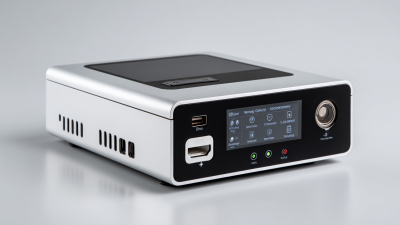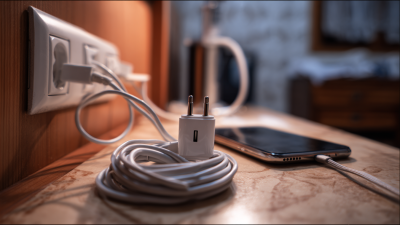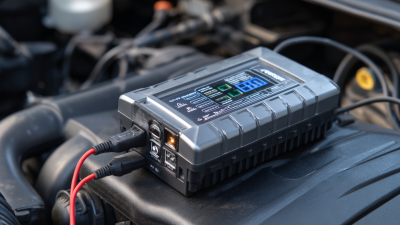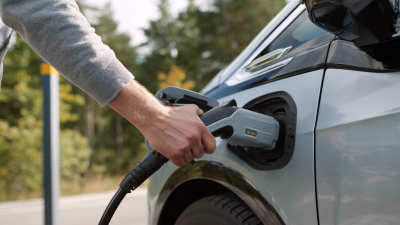As our reliance on digital devices continues to escalate, the demand for faster and more efficient charging solutions is more critical than ever. The rise of the Smart Fast Charger represents a significant leap forward in charging technology, redefining the way we power our gadgets. According to a report by MarketsandMarkets, the global smart charging market is projected to reach $37 billion by 2027, growing at a CAGR of 34.1%. This surge is driven by the increasing need for rapid charging capabilities for smartphones, tablets, and electric vehicles, highlighting the relevance of smart charging solutions in modern life.
Smart Fast Chargers do not simply offer speed; they incorporate advanced features like adaptive charging, which can automatically adjust the power output based on the device's needs. This intelligence not only improves charging efficiency but also extends battery lifespan, a vital aspect as tech users become more sensitive to device longevity. With industry giants continuously innovating, such as Apple and Samsung integrating these technologies into their latest models, the smart charging landscape is evolving rapidly. As we look to the future, the integration of Smart Fast Chargers will undoubtedly play a pivotal role in our increasingly connected world, allowing us the convenience of powering our devices quickly and sustainably.

The evolution of charging technology has been marked by significant advancements that have transformed the way we power our devices. From traditional plug-in chargers to smart fast chargers, the industry has increasingly focused on speed, efficiency, and user convenience. Recent studies have shown that, by 2025, the global market for fast chargers is expected to grow by over 40% annually, reflecting a strong demand for solutions that cater to our fast-paced lives. This surge in popularity is driven not only by consumer need but also by the integration of advanced technologies, including AI and IoT, which enable smarter charging solutions that optimize energy use and reduce costs.
Tips: When choosing a smart charger, consider one that offers adaptive charging capabilities, ensuring your device receives the optimal power level while safeguarding its battery health. Look for chargers equipped with multiple ports to accommodate various devices, making charging more efficient for households with multiple gadgets.
As charger technology evolves, manufacturers are also venturing into wireless charging solutions. This shift has opened new avenues for user convenience, as it eliminates the clutter of cables and allows for seamless connectivity with the growing ecosystem of smart home devices. Staying informed about these advancements can empower consumers to select charging solutions that best fit their lifestyle and technological needs.
The advent of smart fast chargers is transforming the way we interact with our devices, optimizing user experiences through swift charging capabilities and advanced technologies. These chargers, often utilizing gallium nitride (GaN) technology, provide higher power output while remaining compact and lightweight. Reports indicate that GaN chargers can reduce charging time by up to 50%, alleviating battery anxiety that many users face today.
Incorporating smart features, these chargers adjust power output based on the device's needs, ensuring safe and efficient energy transfer. This functionality not only enhances the charging speed but also prolongs the lifespan of batteries by preventing overheating. As highlighted in recent industry insights, faster charging solutions are no longer a luxury but a necessity, especially with the rapid rise in AI-powered smartphones that demand more energy.
**Tips:** When selecting a charger, look for GaN technology for optimal performance. Make sure to check compatibility with your devices to maximize charging efficiency. Additionally, consider smart chargers that include built-in safety features to protect against overheating and overcharging, ensuring a longer battery life and a better overall experience.
Smart fast chargers are changing the way we power our devices, significantly impacting their lifespan and overall performance. Recent studies have indicated that using advanced charging technologies can extend the lifecycle of lithium-ion batteries by up to 40%. According to a 2023 report by the International Energy Agency, smart fast chargers optimize power delivery based on the device's needs, thereby reducing thermal stress and preventing the common pitfalls of overcharging and overheating. This results in a more efficient charging process, allowing devices to retain their original battery capacity for a longer duration.
Moreover, these charging technologies often come equipped with features like adaptive charging and real-time monitoring, which enhance device longevity. A source from the Battery University indicates that regular use of smart fast chargers can improve charge cycles by 30%, meaning users can enjoy optimal performance without having to worry about battery degradation. As consumers become increasingly reliant on their devices, the integration of smart fast chargers not only caters to their need for efficiency but also ensures that the devices perform at their best for years to come.
As technology continues to evolve, so does the need for more efficient and sustainable charging solutions. The role of sustainable energy in future charging technologies cannot be overstated, as it aligns with the global push towards reducing carbon footprints. Innovations such as solar-powered chargers and energy harvesting devices are paving the way for eco-friendly alternatives to traditional charging systems. By harnessing renewable sources, we can mitigate environmental impact while providing reliable power for our devices.
Tip: Consider investing in solar chargers for on-the-go energy solutions. They are lightweight and can be incredibly useful for outdoor activities such as camping or hiking, allowing you to keep your devices powered without relying on grid electricity.
Additionally, smart fast chargers equipped with energy management systems are emerging as a significant contributor to sustainable charging practices. These chargers optimize energy usage and reduce waste by adjusting power delivery based on the device's needs. This not only enhances charging efficiency but also promotes a smarter approach to power consumption.
Tip: Use charging stations that incorporate energy management technology to maximize efficiency and minimize energy usage. Look for features like adaptive charging and timers to ensure you’re charging your devices optimally.
| Charging Technology | Charging Speed (W) | Smart Features | Sustainable Energy Source | Compatibility |
|---|---|---|---|---|
| Wireless Charging | 15W | Qi Standard | Solar Panels | Smartphones, Tablets |
| Fast Charge | 60W | Temperature Control | Wind Energy | Laptops, Smartphones |
| USB-C Power Delivery | 100W | Smart Power Allocation | Hydropower | Various Devices |
| Solar Charging Stations | Up to 22W | Mobile App Monitoring | Solar Energy | Electric Vehicles |
Wireless charging technology is rapidly advancing and is set to redefine how we power our devices. The emergence of smart fast chargers is at the forefront of this revolution, offering not only speed but also enhanced user experience. These chargers utilize innovative technologies such as resonant inductive coupling, allowing devices to charge efficiently without the constraints of wires. As consumers increasingly demand convenience, the integration of wireless charging capabilities into everyday devices like smartphones, wearables, and even electric vehicles has become essential.
Moreover, the trend towards energy-efficient designs is shaping the future of wireless charging. Manufacturers are now focusing on optimizing charging pads and devices to minimize power loss during the charging process. This not only reduces energy consumption but also prolongs the battery life of the devices. Emerging technologies like multi-device charging stations, which can power several gadgets simultaneously, are becoming increasingly popular. As we move into a new era of charging, the combination of speed, efficiency, and convenience will redefine how we think about powering our electronics, making wireless charging an indispensable part of our daily lives.






